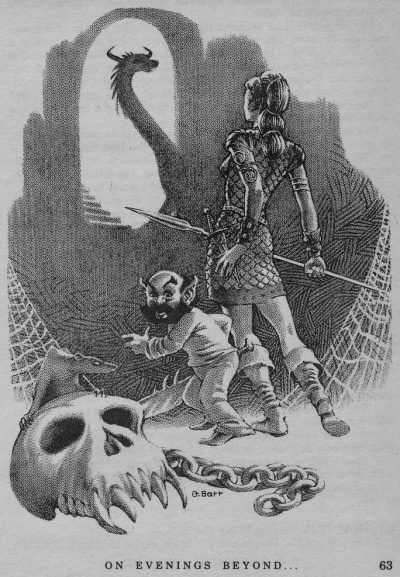Roll the Bones
Starquest
By John M. Ford

15 Aug, 2021
John M. Ford’s science fantasy Starquest is an extremely early roleplaying game, found only in the pages of the July 1979 Isaac Asimov’s Science Fiction Magazine1. The game was presented within an article titled On Evenings Beyond the Fields We Know, which as you all know was my introduction to the very concept of roleplaying games (which Mr. Ford for some reason called “rôle-playing games”).
The article begins with thumbnail descriptions of the bare concepts of roleplaying games, necessary because in 1979 RPGs were an extremely niche interest with which Ford could not assume his readers were familiar. Indeed, the assumption of the piece is that they were not (there’s even a passing explanation of dice in shapes aside from the familiar six-sided dice). Ford being Ford, he then illustrates the concepts by providing examples from a roleplaying game created from scratch, Starquest.
Starquest uses character classes — professions, more or less — and levels, in which expertise increases in defined increments. Using a sample character sheet as his guide, Ford outlines how characteristics (which he calls requisites) work, then guides the reader through the creation of a sample character. Ford briefly outlines the stock universe (conveniently divided between worlds with magic and worlds where science rules) before providing a sample of play.
~oOo~
George Barr’s illustration is so well-done that it might have given readers wildly optimistic expectations regarding RPG art of the era. In practice, companies operated on shoestring finances, art budgets were limited, and companies were perfectly happy to go with whoever in their circle could draw a bit.
Persons familiar with the state of roleplaying games forty-odd years ago (such as yours truly) will be able to make educated guesses from the game design as to what games Ford had encountered at this point. I am sure Dungeons and Dragons must have played a role in the genesis of this work, as did Travellerand The Fantasy Trip.
But so much for my educated game palate. I wouldn’t have to speculate, because the article ends with a list of game companies and their roleplaying games2.
Ford’s exemplar is almost a functional roleplaying game. Certain important charts are mentioned but not provided. Ford being Ford, I am certain the charts existed. I’d be very interested to know if copies survive. Without them, however, the game probably cannot be played. The utility of character levels is unclear to me, but then, I think that about most games that use them.
Playability was not an issue for me when I encountered the essay. The fact Ford let the SF potatoes touch the fantasy peas was a shock. The whole idea of a setting that could be used for either seemed … untidy to me. Thus, I set roleplaying aside until I happened to encounter it again in university, which (in addition to forays into this whole “dating” thing) effectively torpedoed my academic career. Ah, well. But at least it was not John M. Ford’s fault.
If you want a copy of Starquest, you are going to have to track down a copy of the July 1979 Asimov’s.
1: Not to be confused with the Summer 1979 Asimov’s SF Adventure Magazine.
2: Arranged by publisher. Bolding indicates games I’ve never even heard of outside Ford’s essay.
- Fantasy Games Unlimited: Archworld, Chivalry & Sorcery, Bunnies & Burrows
- Flying Buffalo Incorporated: Tunnels & Trolls, Starfaring
- Game Designers Workshop: Traveller
- Heritage Models, Inc: The Emerald Tablet, John Carter of Mars, Star Trek
- Lou Zocchi and Associates: Superhero 2044, Nuclear Survivors, Space Patrol
- Metagaming: The Fantasy Trip, Melee, Wizard
- TSR Games: Dungeons & Dragons, Empire of the Petal Throne, Gamma World, Metamorphosis Alpha.
In case the bolding is not visible for everyone, the games with which I am unfamiliar are: Archworld, Starfaring, The Emerald Tablet, and Nuclear Survivors.
